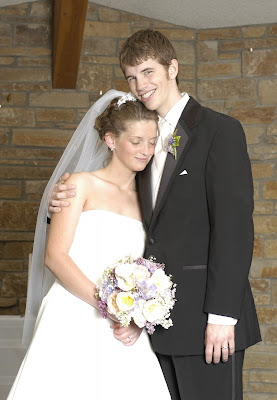 (Part of the role of a short-term missionary is to serve the full-time missionaries any way we can. This is me with two of the Gudemans' 60-lb. bags. I'm strong!)
(Part of the role of a short-term missionary is to serve the full-time missionaries any way we can. This is me with two of the Gudemans' 60-lb. bags. I'm strong!)The big day is finally here. Today at 4:30pm we'll leave for the Denver International Airport to fly through London to Málaga. Then one week later, we're off to Madrid for 7 weeks. Obviously, we're having a lot of emotions: excitement, impatience, nervousness, etc. Over the past few days, I (Meggan) have felt the Holy Spirit reminding me of God's abiding presence and his promise to never leave me or forsake me.
I was talking to my parents last night and told my dad a little memory that has been on my mind lately. When I was pretty young (maybe 7 or 8), my parents told me that they thought my brother might have a call to missions on his life. Indignant that John should be called to something that I was not, I replied that perhaps I, too, had that call. Somewhere along the line, I conveniently forgot that incident and the idea of being a missionary flew from my mind. More than just flew - it became something that I thought I'd never do. Maybe I'd marry a pastor or work myself in the church, but my love for family would always keep me close to home.
Yet, God was preparing me all my life for this, as I see now, looking back on what has been a beautiful, though difficult and often painful journey. I fell in love with Spanish from the first day of class in middle school. I have always been fascinated with other cultures, loving books and movies about other countries. And my love for the Lord and the Lord's love have colored and influenced every decision of my life. To many of my high school classmates who doubtless saw me as a crazy Christian girl, the fact that I might be a vocational missionary probably isn't that surprising.
But, it certainly was to me! Ben and I had very different views of our future life during our engagement and the first six months of marriage: Ben saw us as lifetime missionaries, while I saw us spending a maximum of 3 years overseas and then becoming occasional summer-mission-trip people. We have recently come to the conclusion that God may have intentionally hid these differences from us because we couldn't have handled the truth. Perhaps if we'd realized all this during our engagement, we wouldn't have gotten married! But, by God's grace, here we are, despite the painful first year of marriage in which these differences came to light.
I, in particular, walked through what I have come to call a "Dark night of the soul," though that term actually designates a slightly different process of spiritual formation. I was ruled by fear, tormented by horrific dreams that depicted violence and death. I came to the conclusion that God was asking me to die for him; and how could I refuse - he had died for me! I was angry at God. I remember thinking to myself, "After all I've done for you, now you're going to kill me?!" Of course, how foolish that thought was on many levels. What had I done for God? And never would my Father kill me. His gift is eternal life which has destroyed death's power.
I could not see these truths at that time, however. I was blinded by fear and mistrust. I was tormented by my imagination and the possible scenarios of death I might have to endure. I was literally at a crossroads: would I remain faithful or turn my back on God? While I will not delve into the theological issue of perseverance of the saints here, I will say that I now know 100% that the Holy Spirit living in me as a deposit simply would not allow me to turn away. I felt completely alone, misunderstood by my friends and even my family. I believe that these people in my life were blinded from the reality of the struggle I faced so that I would have no other reliance but God alone.
Somehow, that time ended. I have been on the road of healing ever since. While the struggle was a time of solitude between God and me, the healing has been wrought slowly and surely by many figures in my life. My parents and members of Faith Bible Church in Waupun have prayed for me through minor recurrences of these fears, clearly recognizing their demonic origin. Again, they were kept unaware for a time, but now saw clearly. My mentors at Denver Seminary, Nancy and Joyce, have played huge roles in the redemption of the imagination (a phrase of Nancy's) and the journey and joy of serving God overseas. And it is always a journey of trust.
It is so fitting that today of all days I reminisce about the faithfulness of God to bring me from a place of total fear into a place of baby steps of trust. Though, this trip hardly seems like a baby step. It is a baby step as I am a child walking in step with the Father, following where he leads.
Thank you for your continual love, prayers, and support.
all our love,
Meggan and Ben
